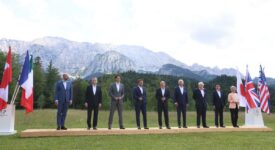European Union ambassadors are convening on Christmas Day (25 December) to be updated by the EU’s chief negotiator, Michel Barnier, on the free-trade deal struck with the UK after months of fraught talks on fishing rights and business rules. UK Prime Minister Boris Johnson has hailed the deal as a “new beginning” for his country . But a major fishing organisation has accused the PM of sacrificing the industry to reach an agreement as the deadline for leaving EU trading rules loomed. EU member states have said they supported the deal that needs to be subsequently ratified by the European Parliament. It is widely expected that EU nations will unanimously back the agreement, a prerequisite for its legal approval. Some Eurosceptic MPs within Johnson‘s own party have privately voiced concerns that the deal did not go far enough but the Labour leader, Keir Starmer, said though it was a “thin agreement”, his party would back it as the only alternative to no deal, meaning it should win approval in the Commons.
The full document, which is about 1,500 pages, is supposed to be published soon. In continental Europe, the French Europe minister, Clément Beaune, hailed it as a “good agreement” and stressed the EU had not accepted a deal “at all costs” because “we needed an agreement less than the British” as “for them, it was a vital need”. Beaune also reminded that “there is no country in the world that will be subject to as many export rules to us as the UK.” Johnson used his Christmas message to sell the deal to a public weary of Brexit after years of acrimonious wrangling since the 2016 referendum. “A deal to give certainty to business, travellers and all investors in our country from January 1. A deal with our friends and partners in the EU,” he said, clutching a sheaf of papers. Johnson has claimed the deal meets the goals set out during the 2016 campaign to “take back control”.
Meanwhile, if we take a close look at the main agreements that make up the trade and security deal finalised, we find that the devil of what has been agreed will be in the detail. These are some of the important provisions of the deal: Firstly, tariff-free and quota-free access to one of the world’s biggest markets is the backbone of the Brexit deal and goes beyond the EU’s deals with Canada or Japan. Secondly, there will be mutual recognition of trusted trader programmes, which means UK producers will have to comply with both UK and EU standards. However, thirdly, there will be no more automatic recognition for doctors, nurses, architects, dentists, pharmacists, vets, engineers. Also, fourthly, in a sharp departure from the pre-Brexit times, UK nationals will no longer have the freedom to work, study, start a business or live in the EU, as visas will be required for stays over 90 days. Fifthly, the UK has agreed it will leave the common fisheries policy but 25% of EU boats’ fishing rights in UK waters will be transferred to the UK fishing fleet, over a “transition period” of five-and-a-half years. And last, but not the least, the UK is out of the Erasmus university exchange programme, baulking at the EU’s insistence that to be an associate member it would have to commit to a seven-year payment plan.
Article Tags:
Boris Johnson · Brexit · European Union · Keir Starmer · Michel Barnier · Trade AgreementArticle Categories:
SECURITY & DEFENSE






